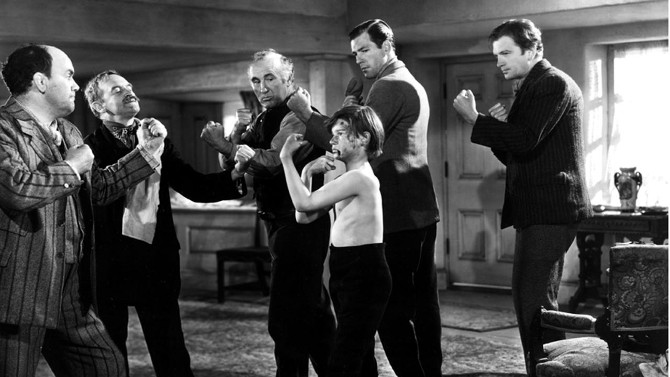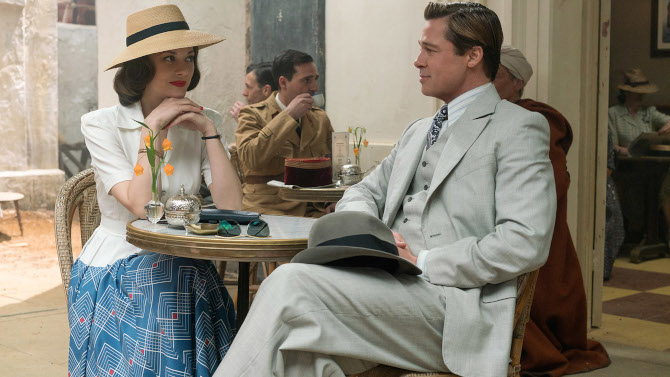
Déjà vu Dalliance
Channeling the mesmeric movies churned out by the studio system back in the 1930s and 40s, Allied (2016), directed by Robert Zemeckis, channels the likes of Morocco, Casablanca, Across the Pacific, Gilda, To Have and Have Not, and numerous others – attempting to find a spark from the classic themes of melodrama, romance, suspense and the epic nature of the annals of the cinematic past, with quite successful results. Set the year Casablanca and Across the Pacific were released – 1942, the story in fact starts in Morocco, with recently parachuted in Canadian spy Max Vatan (Brad Pitt) meeting up with another undercover agent, Marianne Beauséjour (Marion Cotillard), who will be pretending to be his wife.
-

Flying High Under the Radar
American MadeApril 27, 2018With the “based on real events” thing getting a bit old, some recent films have started to have fun with this oft-used opening – American Hustle introed with “Some of this actually happened”, while today’s film, Doug Liman’s American Made, was described by the director as “a fun lie based on a true story”. . . a clever way to accentuate the addition of many fictional plot points to enrich the narrative. Tom Cruise plays Barry Seal, a seemingly staid airplane pilot secretly looking for a thrill in his exhausting, routine-driven life. Married to Lucy (Sarah Wright), they have what a traditionalist would coin – the middle class dream – family, home, and solid income. Yet, a well informed CIA agent, Monty ‘Schafer’ (Domhnall Gleeson), tracks Barry down at the end of one of his flights – it does not take much to convince the pilot to sign up, and he is soon working questionable missions for the agency all over Central America.
-
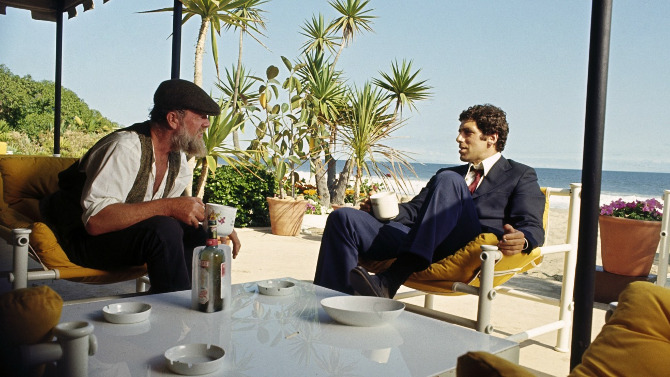
The Marlowe Man
The Long GoodbyeApril 6, 2018Tackling Raymond Chandler’s1953 novel “The Long Goodbye” (which features detective Philip Marlowe) in a unique way, director Robert Altman decided to, “call him Rip Van Marlowe, and we took the position that he had been asleep for twenty years, woke up, and Elliott [Gould] just wandered through that film. . . and that was our idea – that he was wandering through this landscape, the film trying to invoke the morals of a previous time into this early seventies.” Set exactly twenty years after the novel’s release date, detective Philip Marlowe (Gould) awakes in the middle of the night from a deep sleep – voice raspy, five o’clock shadow quickly moving onto six. . . a man in an endless stupor. His retro suits, skinny ties and constant smoking are out of place, much like his 1948 Cabriolet Lincoln Continental Convertible – a gent who is undoubtably from another time (even his salary closely resembles what a detective would make in the late 40s or early 50s).
-
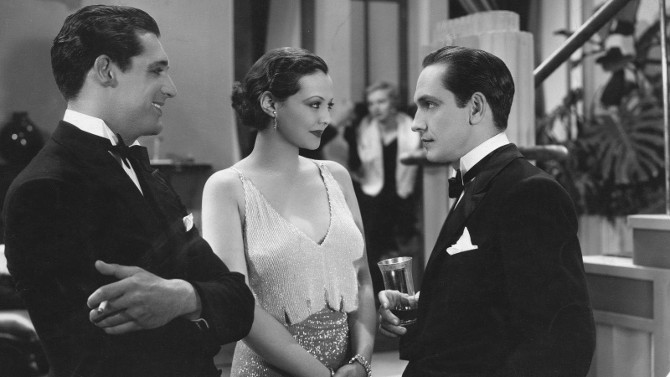
Hell Hath No Fury. . .
Merrily We Go to HellMarch 26, 2018In this era of female empowerment, a name from the past that must be highlighted is Dorothy Arzner. Starting as a typist in the film business for director William C. de Mille (the older brother of Cecil), less than a year later, she had worked her way up to screenwriter, soon after, promoted to editor. Editing star Rudolph Valentino’s Blood and Sand, her impressive skill was immediately evident. Continuing to do stellar work, she eventually threatened to move from Paramount to rival Columbia if not given a directorial job, the studio conceding in 1927. The only major female director in Hollywood during its “Golden Age”, she was able to transition from silent films to talkies (the first female director to make one), and, while filming 1929's The Wild Party, is credited with essentially developing the first boom mike – some say it was to help star Clara Bow get over her fear of talking on camera, others to end her frustration of always having to hide a microphone in one spot on set. . . in any case, she had technicians rig a microphone onto a fishing rod, solving the problem (and, though she did not patent the idea, Edmund H. Hansen did one year later, she is credited with its invention).
-
Star Pick with Alex Trebek
 This is JeopardyHow Green Was My ValleyMarch 13, 2018
This is JeopardyHow Green Was My ValleyMarch 13, 2018Sometimes, you need luck on your side. As you can probably imagine, many of the celebrity interviews I conduct are arranged well in advance. . . though, not always. A prime example of said luck, as I attended a National Hockey League game a few months back, I just happened to bump into the one and only Alex Trebek. A man who definitely does not need an introduction, he has hosted one of the most popular game shows in the history of television – Jeopardy, since its revival in 1984 (when it became a daily syndicated show). . . he has also emceed many others, including High Rollers and Classic Concentration, to name but a few. So popular in fact, Trebek was spoofed for years by Will Ferrell on Saturday Night Live (always the butt end of one of Darrell Hammond’s Sean Connery puns/gags about his mother).
-
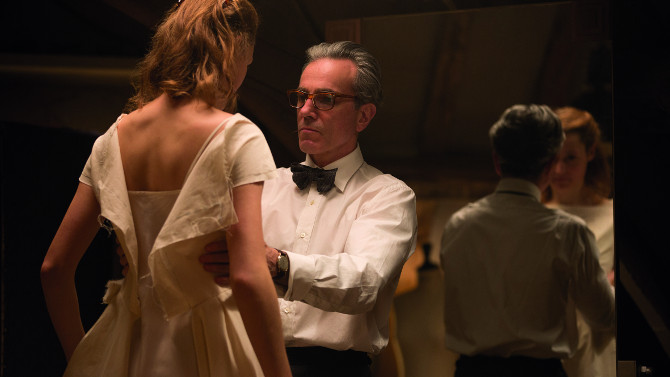
What a Tangled Web We Weave. . .
Phantom ThreadFebruary 18, 2018Perhaps the end of something very special. . . that is, if Daniel Day-Lewis does follow through and retire from acting after his most recent lauded performance in Paul Thomas Anderson’s Academy Award Best Picture nominee Phantom Thread. It is this nuanced role that will bookend a career that has consisted of six deserving nominations and three well earned Oscars (four, if he wins this year). At the heart of this tale of gothic romance (Anderson’s narrative and classic visual aesthetic reminiscent of movies like Rebecca), Reynolds Woodcock (Day-Lewis) is a renowned dressmaker (circa the 1950s), a man who, like his flawlessly tailored clothing (he hides secrets in the work), expects everything to be just perfect. He is peculiar in his cleanliness and rigidity – every hair in its place, absolute quiet at breakfast (his entire day ruined if his stringent routine interrupted). . . obsessive in every which way, including in that he is still haunted by the death of his mother. An example of this fiefdom of rules and attitude – after tea is brought to him at the wrong time, he exasperatingly exclaims, “the tea is going out; the interruption is staying right here with me”.
-

Coming of Age
Call Me by Your NameFebruary 15, 2018The third and final part of filmmaker Luca Guadagnino’s thematic ‘Desire’ trilogy (following 2015's A Bigger Splash and 2009's I Am Love), 2017's Call Me by Your Name once again challenges its audience with themes of love (sometimes first) and loss, desire, sexuality and so much more. Nominated for four Academy Awards this 2018 (including Best Picture), the story, set in 1983, follows seventeen year old Elio (Timothée Chalamet – nominated for Best Actor in a Leading Role), a whip smart, though somewhat aloof and self-conscious teen who is spending the summer with his family in Northern Italy – he is a voracious reader and talented musician (a near prodigy). His father, Mr. Perlman (Michael Stuhlbarg), is an archaeology professor who has invited a graduate student, Oliver (Armie Hammer), to aid him as a research assistant.

